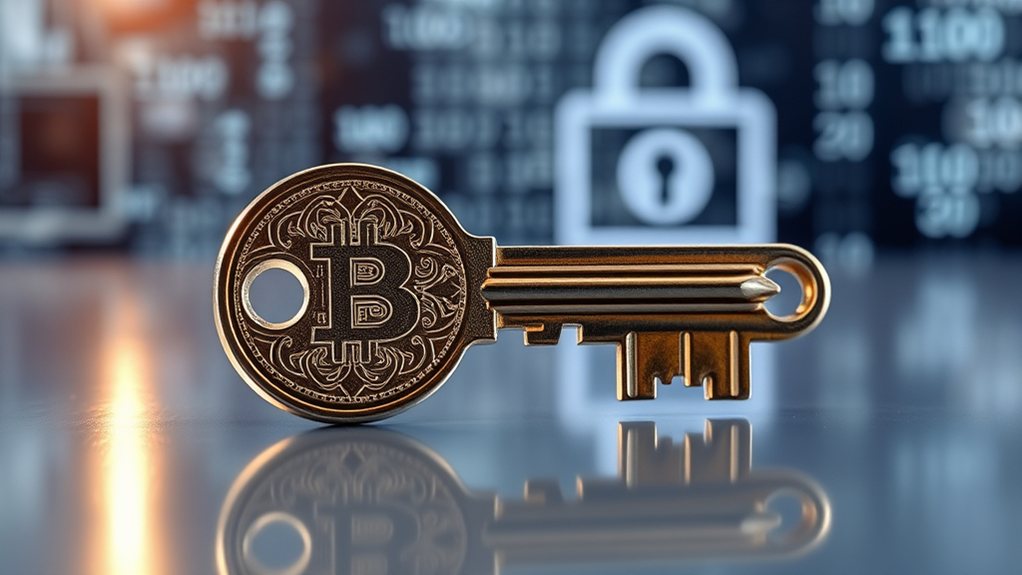Private keys are unique cryptographic codes that secure cryptocurrency and digital assets. They function like digital signatures, authorizing blockchain transactions when used. Each private key pairs with a public key that can be shared openly. When someone loses their private key, they permanently lose access to their funds. No "forgot password" options exist in this technology. Hardware wallets provide the safest storage for these essential security elements.

The backbone of cryptocurrency security lies in private keys. These are unique cryptographic codes that give users access to their digital assets. A private key is a randomly generated string of letters and numbers that works like a password for a cryptocurrency wallet or account. But unlike regular passwords, private keys can't be reset if forgotten or lost.
Private keys function as digital signatures in the cryptocurrency world. When someone wants to send Bitcoin or other cryptocurrencies, they must use their private key to sign the transaction. This signature proves they're the rightful owner of the funds and authorizes the blockchain to process the transfer. It's similar to signing a check, but with advanced cryptography that makes it nearly impossible to forge.
These keys work within a system called asymmetric cryptography. Each private key has a matching public key, which can be shared openly. The public key creates addresses where people can send funds, but only the person with the private key can spend those funds. It's mathematically impossible to figure out someone's private key from their public key, which is why this system is secure. This approach mirrors how SSL/TLS certificates secure website communications, keeping sensitive data protected during transmission.
Private keys can take different forms. They might appear as a long string of characters, but many modern wallets present them as a series of 12 to 24 ordinary words called a "seed phrase" or "recovery phrase." This format is easier for humans to write down and store. Some Bitcoin wallets use a format called WIF (Wallet Import Format), while others may use encrypted keystore files.
The generation of private keys requires truly random processes. Wallets use cryptographically secure random number generators to create these keys. Some wallets can derive multiple keys from a single master key, allowing users to manage several accounts from one seed phrase. The security of these keys depends significantly on their length and randomness, which directly impacts their resistance to brute-force attacks.
Security of private keys is paramount in cryptocurrency. If someone loses their private key, they permanently lose access to their funds. There's no "forgot password" button or customer service to call. Similarly, if hackers gain access to a private key, they can steal all associated funds instantly.
Most crypto users store their private keys in wallets, which can be software programs, mobile apps, hardware devices, or even pieces of paper. Non-custodial wallets are particularly important as they give users complete control over their private keys without relying on third parties. Hardware wallets are considered the most secure option as they keep private keys in specialized devices that never connect directly to the internet.
For maximum security, many cryptocurrency holders keep multiple backups of their private keys in different secure locations. They avoid storing keys on internet-connected devices and never share them with others. As cryptocurrency adoption grows, managing these keys securely remains a fundamental challenge for users.
Frequently Asked Questions
How Do I Store My Private Keys Securely Offline?
Cryptocurrency owners can store private keys securely offline through several methods.
Hardware wallets like Ledger and Trezor keep keys in specialized devices.
Paper wallets involve printing keys on physical paper and storing them in safes.
Air-gapped computers never connect to the internet, protecting keys from online threats.
Metal storage options engrave keys on materials that withstand extreme conditions.
These "cold storage" approaches offer protection against hacking and digital vulnerabilities.
Can Private Keys Be Recovered if Forgotten or Lost?
Private keys can't be recovered if lost without backups. Unlike regular accounts, there's no "forgot password" button in cryptocurrency.
Recovery depends on preparation. Users need backup methods like seed phrases or paper copies stored safely offline. Some exchanges offer account recovery for custodial wallets.
Newer solutions include social recovery systems and smart contract wallets, but these aren't universal. Without backups, crypto assets are permanently lost.
Are Some Private Key Formats More Secure Than Others?
Yes, some private key formats offer better security than others.
Encrypted PKCS#8 format provides stronger protection than basic PEM files. The binary DER format is more secure than plain text formats.
Encrypted keys using AES-256 and strong password derivation functions add additional protection layers.
Hardware-protected formats are generally considered the most secure option.
Key format security often depends on encryption strength and storage method.
How Often Should I Change or Rotate My Private Keys?
Private keys should typically be rotated every 1-3 years, according to standard security practices.
Organizations handling sensitive data may rotate keys more frequently, sometimes quarterly.
Factors affecting rotation schedules include the data's sensitivity, potential exposure risks, and compliance requirements.
Many companies follow industry regulations that mandate specific timeframes.
Automated systems can help manage regular rotation, making the process more reliable and less prone to human error.
Can Quantum Computers Break Current Private Key Encryption?
Quantum computers pose a significant threat to current private key encryption. Large-scale quantum computers running Shor's algorithm could break widely-used RSA and ECC encryption methods.
Scientists estimate this threat may materialize between 2030-2040. Organizations are developing "quantum-safe" alternatives through post-quantum cryptography standards.
The NIST is working to standardize resistant algorithms, with implementations expected by 2024. "Harvest now, decrypt later" attacks remain a current concern.














